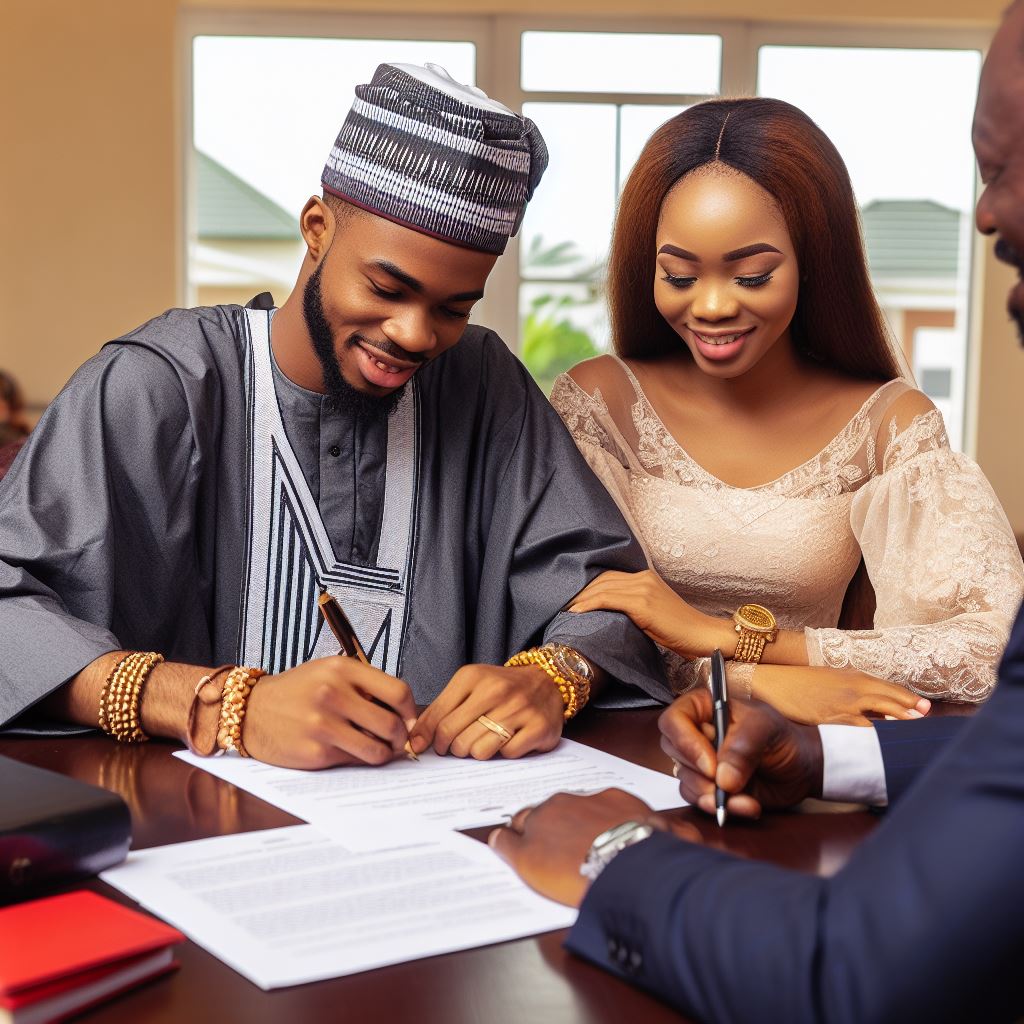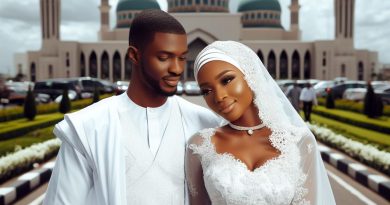Understanding Marriage Contracts in Nigeria: A Guide
Last Updated on October 25, 2023
Introduction
A. Brief Overview of Marriage in Nigeria
Marriage in Nigeria is a cherished cultural institution, deeply rooted in traditions and customs.
Nigerian weddings are vibrant celebrations, reflecting the diverse ethnicities within the country.
Couples embark on this sacred journey with great joy and reverence, honoring age-old rituals.
B. Importance of Understanding Marriage Contracts in Nigeria
- Legal Protection: Marriage contracts offer legal safeguards, ensuring the rights and responsibilities of both partners.
- Financial Security: Clear agreements define property rights and financial responsibilities, providing stability for the couple.
- Cultural Variations: Nigeria’s diverse cultures mean marriage customs vary; understanding contracts navigates these intricacies.
- Family Harmony: Clarity in contracts promotes family understanding, preventing potential disputes in the future.
- Modern Adaptations: In contemporary Nigeria, marriage contracts adapt to societal changes, making comprehension vital for couples’ harmony.
In this section, we delve into the nuances of marriage contracts, emphasizing their significance in Nigeria’s rich cultural tapestry.
The Legal Framework of Marriage Contracts in Nigeria
A. Explanation of the Marriage Act
The legal framework for marriage contracts in Nigeria is governed by the Marriage Act.
This act outlines the legal requirements and procedures for formalizing marriages in the country.
B. Overview of the Different Types of Marriage Recognized in Nigeria
Nigeria recognizes three main types of marriages:
- Customary Marriages: Customary marriages are based on the traditions and customs of different Nigerian ethnic groups. These marriages are valid and legally binding in Nigeria.
- Statutory Marriages: Statutory marriages are performed under the provisions of the Marriage Act. They are typically conducted in a registry office and follow specific legal procedures.
- Islamic Marriages: Islamic marriages, governed by Sharia law, are recognized for Muslims in Nigeria. They must also comply with the Marriage Act.
C. Requirements and Procedures for Each Type of Marriage
1. Customary Marriage Requirements
- Consent of both parties and their families.
- Payment of bride price and other customary obligations.
- Traditional ceremonies as per the ethnic group’s customs.
2. Statutory Marriage Requirements
- Application for marriage at the marriage registry.
- Submission of necessary documents like birth certificates, passport photographs, and statutory fees.
- Issuance of a marriage certificate.
3. Islamic Marriage Requirements
- Compliance with Islamic laws and customs.
- Registration at the marriage registry.
- Fulfillment of any additional requirements specified by the Islamic authority.
D. Legal Consequences of Each Type of Marriage
- Customary marriages grant spousal rights but may not offer legal protection outside the cultural context.
- Statutory marriages provide full legal protection and recognition.
- Islamic marriages, while recognized, may require statutory registration for full legal benefits.
Understanding these legal aspects is vital for couples in Nigeria to make informed decisions about their preferred type of marriage contract and its legal consequences.
Read: Modern vs. Traditional: Marriage Ring Trends in Nigeria
Key Elements of a Marriage Contract in Nigeria
A. Definition and purpose of a marriage contract
A marriage contract in Nigeria is a legally binding agreement that outlines the rights and obligations of both spouses.
It serves as a framework for the marital relationship, addressing various aspects of the marriage.
B. Role of consent and age requirements
The consent of both parties involved is a fundamental element of a valid marriage contract in Nigeria.
Both individuals must freely give their consent and meet the minimum age requirements set by the law.
C. Financial considerations and property rights
Marriage contracts in Nigeria commonly include provisions regarding financial matters and property rights.
This ensures clarity regarding the management and distribution of assets acquired during the marriage.
D. Obligations and responsibilities of both spouses
A crucial aspect of a marriage contract in Nigeria is the delineation of the obligations and responsibilities of each spouse.
This includes issues such as cohabitation, fidelity, support, and the upbringing of children.
E. Inclusion of prenuptial agreements and conditions
Prenuptial agreements and conditions can be included in a marriage contract in Nigeria.
These agreements can address matters such as property division, spousal support, and custody arrangements in case of divorce.
A marriage contract in Nigeria encompasses various key elements that ensure the legality and protection of both spouses.
These elements include defining the purpose of the contract, obtaining consent, addressing financial considerations and property rights, outlining obligations and responsibilities, and incorporating prenuptial agreements and conditions if desired.
Read: Marriage Ring Etiquette: What Every Nigerian Should Know

Procedures for Drafting a Marriage Contract in Nigeria
A. Importance of legal advice
Legal advice is crucial when drafting a marriage contract in Nigeria to ensure its validity and enforceability.
B. Steps to take in creating a marriage contract
- Identify the specific terms and conditions that both parties agree on.
- Consult with a reputable and experienced lawyer specializing in family law.
- Draft the marriage contract document, clearly stating the agreed-upon terms.
- Thoroughly review the contract and make any necessary revisions or amendments.
C. Importance of signing and witnessing the contract
Signing and witnessing the marriage contract play a crucial role in ensuring its legal validity.
When preparing to sign the contract:
- Ensure that both parties fully understand the content of the contract.
- Arrange a suitable date and time for signing.
- Select two witnesses who are of legal age and competent to testify.
- Ensure that all parties sign the contract, including the witnesses.
- Have the witnesses provide their full names, addresses, and signatures.
- Consider getting the contract notarized for additional legal certainty.
By signing and witnessing the contract, the parties demonstrate their commitment to abide by the terms.
If any disputes arise in the future, the signed and witnessed contract serves as solid evidence.
It is crucial to understand that a marriage contract without proper signatures and witnesses may not be legally enforceable.
Therefore, it is wise to seek legal guidance throughout the process to avoid any potential pitfalls.
Moreover, the role of the lawyer goes beyond just drafting the contract.
A qualified lawyer can provide valuable advice, especially when it comes to the specific clauses and provisions.
By working closely with a legal expert, both parties can create a marriage contract that suits their individual needs and concerns.
A well-drafted contract will protect the interests of both spouses and provide a clear roadmap for potential issues.
In fact, when entering into a marriage contract in Nigeria, it is essential to seek legal advice and follow proper procedures.
Identifying terms, consulting with a lawyer, drafting the contract, reviewing and revising, and signing with witnesses are vital steps in the process.
By prioritizing legal guidance and adhering to these procedures, couples can create a legally valid and enforceable marriage contract.
Read: Price Guide: Getting a Marriage Ring in Lagos Markets
Protecting the Rights and Interests of Spouses
A. Importance of knowing and understanding one’s rights
Knowing and understanding one’s rights in a marriage contract is crucial for a successful union.
It allows spouses to assert their rights and make informed decisions in a relationship.
By being aware of their rights, spouses can ensure that they are treated fairly and with respect, creating a strong foundation for a healthy and lasting marriage.
B. Remedies available for breaches of marriage contracts
In cases where one spouse breaches a marriage contract, there are several remedies available to the aggrieved party.
The affected spouse can seek legal recourse through the court system to enforce the terms of the contract and hold the violating spouse accountable.
These remedies may include compensation for damages, specific performance of obligations, or even termination of the marriage contract itself.
C. Seeking legal assistance and dispute resolution mechanisms
When faced with disputes or breaches in a marriage contract, spouses should consider seeking legal assistance.
A knowledgeable lawyer can provide guidance and representation, helping spouses navigate the complex legal landscape surrounding marriage contracts.
Alternative dispute resolution mechanisms such as mediation or arbitration can also be helpful in resolving conflicts amicably and avoiding costly litigation.
D. Ensuring equitable distribution of assets in case of divorce or death
Another crucial aspect of protecting the rights of spouses is ensuring equitable distribution of assets in case of divorce or death.
Spouses should carefully negotiate and include provisions in their marriage contract that address property division, alimony, and inheritances.
This ensures that both parties are protected and that assets are distributed fairly, preventing potential conflicts and disputes in the future.
Proper estate planning and the inclusion of a prenuptial agreement can also provide additional protection for spouses and their respective interests.
By understanding their rights, utilizing available remedies, seeking legal assistance, and ensuring equitable distribution of assets, spouses can safeguard their rights and interests in a marriage contract.
A strong understanding of these principles creates a solid foundation for a harmonious and fulfilling relationship.
Ultimately, protecting the rights and interests of spouses is essential for building a healthy and sustainable marriage that stands the test of time.
Read: How to Care for Your Marriage Ring: Tips and Tricks
Conclusion
A. Recap of the main points discussed in the blog post
To fully understand marriage contracts in Nigeria, it is important to know that they can be both oral and written agreements.
Legal requirements for marriage contracts include two witnesses, parental consent for minors, and of course, the free consent of both parties.
Customary law and Islamic law also play a significant role.
B. Significance of understanding marriage contracts in Nigeria
Understanding marriage contracts in Nigeria is crucial, as they determine the rights and obligations of both parties.
They protect individuals in case of divorce, separation, or the death of a spouse.
Knowing the laws surrounding marriage contracts can help prevent legal complications and ensure fair treatment.
C. Encouraging readers to seek legal advice and take proactive measures when entering into a marriage contract
It is highly advised that individuals consult with a legal professional before entering into a marriage contract in Nigeria.
They can provide guidance on the legal requirements, draft a comprehensive and enforceable agreement, and ensure that both parties are well-informed and protected.
In review, understanding marriage contracts in Nigeria is essential for a successful and fair marriage.
By seeking legal advice and taking proactive measures, individuals can safeguard their rights and ensure a solid foundation for their union.


